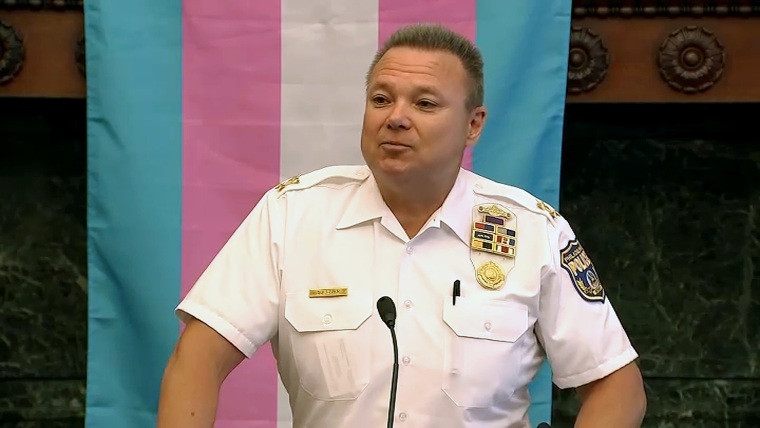A new policy adopted by the Philadelphia Police Department outlines how officers should interact with transgender and nonbinary individuals.
Under Directive 4.15, announced Tuesday, officers are required to record a person’s chosen name and pronouns, regardless of the information on their identification. Officers are also instructed to transport and house transgender people who are in custody separately from other incarcerated people “whenever possible” as well as allow trans people to express their preference for the gender of the officer who searches them.
Transgender and nonbinary people “have historically faced humiliating, hurtful treatment during their interactions with law enforcement,” a statement released by the city of Philadelphia said. “The new PPD policy aims to provide clear instructions to personnel in order to prevent such incidents in Philadelphia.”
A recent report from the National Center for Transgender Equality revealed that as of May, most of the 25 largest police departments in the United States had not adopted policies that protect transgender people. None of the departments studied explicitly required regular training on transgender interaction policies nor did they require officers to “respectfully record the name currently being used by the individual.” Only nine of the 25 departments included gender identity in their nondiscrimination policies.
“Philly’s new policy is one of the strongest policies put in place by any city in the nation and is a tremendous step forward in ensuring transgender and gender-expansive people are treated with respect by law enforcement,” said Jason Landau Goodman, executive director of the Pennsylvania Youth Congress, a statewide LGBTQ advocacy organization. “As we recognize the 50th anniversary of Stonewall, we must move forward to make sure the most vulnerable are protected.”
Though Philadelphia’s transgender policy marks progress, Gillian Bransetter, a spokesperson for the National Center for Transgender Equality, said in an emailed statement that the police must continue to work to “heal the mistrust between law enforcement and minority communities, including the transgender community.”
According to NCTE’s 2015 U.S. Transgender Survey, 58 percent of transgender people who interacted with police in the previous year reported that they were mistreated and faced verbal harassment, misgendering, physical assault and/or sexual assault. More than half of the survey’s transgender respondents said they would be afraid to ask the police for help.
“The Department continues to fall short on key areas, including restrictions to prevent officer sexual misconduct, collaboration with immigration enforcement, instructing officers not to police the public restroom use of transgender people or others who don't conform to gender stereotypes, use of condoms as evidence of a crime, and most importantly, strong civilian oversight,” Bransetter wrote. “As the recent revelations about biased social media posts from numerous current and former local officers illustrate, Philadelphia, like most cities, still has much to do to reduce the role of police in people's daily lives.”
More than 70 Philadelphia officers were recently placed on administrative duty as internal affairs investigated whether any of their posted content — some of which were anti-trans comments — violated the department's social media policy, and last week, 10 of the city’s police recruits resigned after they tried to cheat on an open-book exam.
“The fact that this new policy is not guidance, but is an actual policy makes a huge difference,” Goodman said. “Officers could lose jobs if they don’t adhere to the policy, which encourages accountability in their interactions with the public.”



